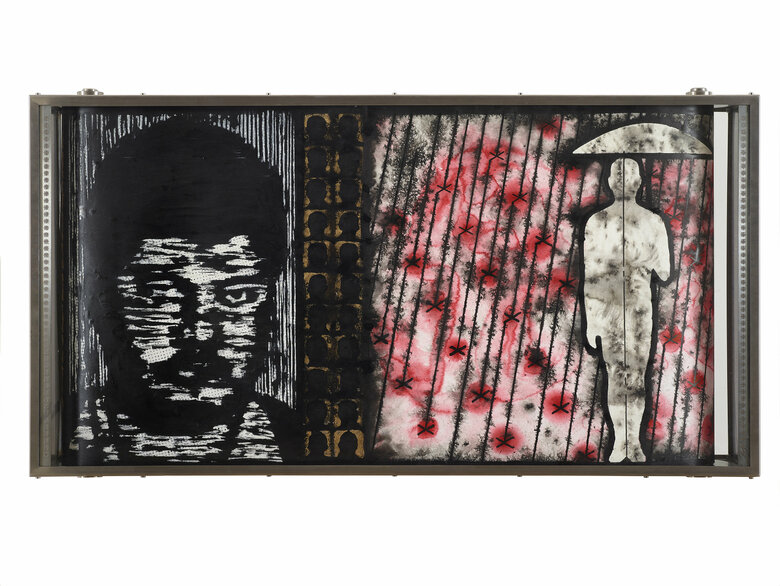The Lovers: National Reunion, 2022, is a collage giclee print by Lebanese artist Alfred Tarazi, part of Tarazi’s broader series titled The Lovers. Tarazi maps two pivotal phenomena that rocked Lebanon in the 1970s : the palestinian revolution and the sexual liberation movement. The sexual liberation challenged traditional codes of behavior related to sexuality and interpersonal relationships throughout the developed Western world from the 1960s to the 1970s.
The Lovers: National Reunion explores the interconnected lives of Georgina Rizk and Ali Hasan Salameh. Rizk was crowned Miss Universe in 1971 at just eighteen, and Salemeh was a chief security officer with the Palestinian Liberation Organization (PLO), founded in Beirut in 1964. Georgina Rizk and Ali Hassan Salameh became entangled in a love story amid the tumultuous background of the Lebanese Civil War. This investigation delves into the convergence of a revolutionary love story with the convoluted machinations of Lebanese politics during the war.
The collage juxtaposes various political discourses and humor with images of Georgina Rizk and known figures of the Lebanese Civil War’s scenes such as Bachir El Gemayel, the Lebanese militia commander who led the Lebanese Forces, the military wing of the Kataeb Party during Lebanon’s Civil War, and was elected President of Lebanon in 1982. As such, Tarazi explores themes of love and conflict. The work is an irreverent take on the relationships between the groups at war, whereby they would communicate and coordinate together in the pursuit of their own interests, meanwhile their overarching discourse was characterized by fundamentally diverging political ideologies.
This is symbolized in the depicted relationship between Rizk and Salemeh, whose love story was violently interrupted with the assassination of Salameh in January 1979. Here, their relationship works as a symbolic narrative of all the factions that were in conflict, but were simultaneously forced to work together at various instances to further their goals.
Beyond the fleeting moments of romance, The Lovers: National Reunion echoes the broader struggles and destinies of millions caught in the throes of war. It stands as a testament to the absurdity of the discourses that prevailed during an exceptionally bloody conflict.
As a post-war generation artist, Tarazi thoroughly explores the consequences of the civil war across political, geographical, and social landscapes, integrating themes of love, humor, and national identities. Tarazi’s work reflects his continuous investigation and reevaluation of recorded history, aiming to approach Lebanon’s intricate past in different ways by introducing the romantic and political entanglements of significant social and political figures during the Lebanese Civil War.

.jpg)
.jpg)



